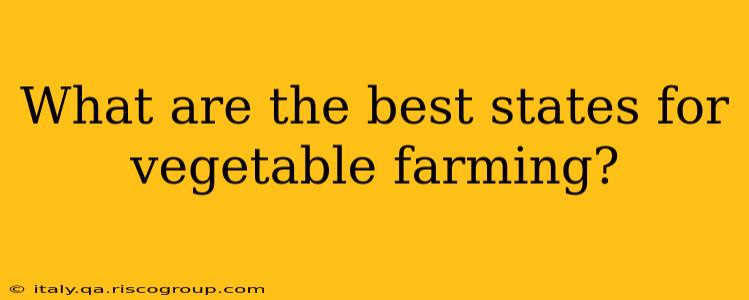The ideal state for vegetable farming depends heavily on the specific vegetables being grown and the farmer's priorities (e.g., maximizing yield, minimizing risk, organic practices). However, several states consistently excel in various aspects of vegetable production, boasting favorable climates, fertile soil, and established agricultural infrastructure. Let's delve into some of the top contenders:
Top States for Vegetable Farming: A Comprehensive Overview
Several factors contribute to a state's suitability for vegetable farming. These include:
- Climate: A long growing season with ample sunshine and moderate temperatures is crucial.
- Soil Quality: Fertile, well-drained soil is essential for healthy plant growth.
- Water Availability: Reliable access to irrigation is vital, especially in drier regions.
- Infrastructure: A robust transportation network is needed to efficiently move produce to market.
- Labor Force: A skilled and available workforce is essential for successful farming operations.
Based on these factors, here are some of the best states for vegetable farming in the US:
California: The Undisputed King
California reigns supreme in vegetable production, largely due to its diverse microclimates, fertile valleys, and advanced agricultural technology. Its vast acreage dedicated to vegetable farming allows for a wide range of crops, from leafy greens to tomatoes and melons. The state's proximity to major markets also facilitates efficient distribution. However, California faces challenges with water scarcity and increasing land costs.
Florida: A Southern Powerhouse
Florida's warm climate allows for year-round vegetable production, specializing in winter vegetables like tomatoes, peppers, and strawberries. Its abundant sunshine and generally fertile soils provide ideal growing conditions. Like California, access to water resources remains a key concern.
Texas: Diverse Growing Regions
Texas boasts diverse growing regions, ranging from the high plains to the coastal areas. This allows for a variety of vegetable crops, with onions, potatoes, and carrots being prominent examples. Texas's large land area and relatively low land costs provide a competitive advantage. However, variations in climate across the state can present challenges for consistent production.
Washington: Leading in Specific Crops
Washington excels in specific vegetable crops, notably potatoes, onions, and sweet corn. Its fertile soils in the Yakima Valley provide ideal conditions for these crops. The state also benefits from a strong agricultural infrastructure and research capabilities.
Other Notable States:
While the states above consistently rank highly, others deserve mention for their contributions to specific vegetable sectors:
- Arizona: A significant producer of winter vegetables, benefiting from its sunny climate and access to water resources.
- Wisconsin: Known for its dairy industry, Wisconsin also boasts a strong vegetable sector, especially for potatoes, and other cool-season crops.
- Michigan: With its diverse climate and fertile soil, Michigan produces a wide array of vegetables.
- Colorado: Strong in potatoes and other specialty vegetables, benefiting from its high altitude and unique growing conditions.
Factors to Consider When Choosing a State
While the states mentioned above offer excellent opportunities for vegetable farming, several factors should be considered:
- Specific Crop Requirements: Different vegetables have specific climate and soil requirements. Research the ideal conditions for your chosen crops.
- Market Demand: Consider the local and regional demand for your vegetables.
- Land Costs: Land prices vary significantly across states.
- Water Availability and Costs: Access to reliable and affordable irrigation is crucial.
- Labor Costs and Availability: Factor in the costs and availability of skilled labor.
- Government Regulations and Support: Understand local agricultural regulations and available government support programs.
By carefully considering these factors, aspiring vegetable farmers can identify the best state to establish their operations and maximize their chances of success. Remember, thorough research and a well-developed business plan are crucial for success in any agricultural endeavor.

